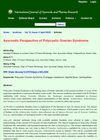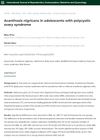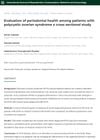 April 2022 in “International Journal of Ayurveda and Pharma Research”
April 2022 in “International Journal of Ayurveda and Pharma Research” Ayurveda views Polycystic Ovarian Syndrome (PCOS) as a metabolic disorder caused by an imbalance of Vata, Kapha, and Pitta, and suggests treatments like Samsodhanam, Agneya Dravyas, and Swayoni Vardhana dravyas.
[object Object]  April 2022 in “International Journal of Health Sciences (IJHS)”
April 2022 in “International Journal of Health Sciences (IJHS)” A holistic treatment approach, including yoga, diet, exercise, and mindfulness, can effectively manage PCOS symptoms.

Polycystic ovary syndrome (PCOS) affects about 10% of women, is often linked to obesity and family history, and can cause irregular periods, fertility issues, and other symptoms. It's usually managed with lifestyle changes, weight loss, and medication.

Women with polycystic ovary syndrome (PCOS) show higher levels of hope, judgement, perspective, and transcendence, and could benefit from positive psychology therapy.
 February 2022 in “International journal of reproduction, contraception, obstetrics and gynecology”
February 2022 in “International journal of reproduction, contraception, obstetrics and gynecology” Acanthosis nigricans in teenage girls with PCOS is a sign of obesity, not insulin resistance or glucose intolerance.
 February 2022 in “Research Square (Research Square)”
February 2022 in “Research Square (Research Square)” High levels of Anti-Müllerian Hormone (AMH) in the blood can strongly predict Polycystic Ovarian Syndrome (PCOS) and related issues in women of reproductive age.
 February 2022 in “Mediators of Inflammation”
February 2022 in “Mediators of Inflammation” Women with Polycystic Ovary Syndrome (PCOS) have lower levels of a substance called DIAPH1 in their blood, which is linked to changes in sugar metabolism and insulin resistance.
 January 2022 in “Journal of family medicine”
January 2022 in “Journal of family medicine” Polycystic Ovarian Syndrome (PCOS) can cause chronic inflammation, mental health issues, and changes in gut bacteria, but a holistic lifestyle change can significantly improve these conditions.
 January 2022 in “IntechOpen eBooks”
January 2022 in “IntechOpen eBooks” Some lesser-known causes of PCOS include autoimmune issues, genetic mutations, and changes in the body's microbiome.
January 2022 in “International Research Journal of Ayurveda & Yoga” Ayurveda treats PCOS by balancing body elements and using lifestyle changes and herbs.

Resveratrol improved hormone levels, menstrual cycles, hair loss, and ovarian function in PCOS patients.
 December 2021 in “The Journal of clinical endocrinology and metabolism/Journal of clinical endocrinology & metabolism”
December 2021 in “The Journal of clinical endocrinology and metabolism/Journal of clinical endocrinology & metabolism” Men can have genetic risks for PCOS-related traits like obesity and diabetes.
 October 2021 in “Journal of Advanced Biomedical and Pharmaceutical Sciences”
October 2021 in “Journal of Advanced Biomedical and Pharmaceutical Sciences” Vitamin D helps improve PCOS by aiding insulin function and ovarian health.
September 2021 in “Journal of pharmaceutical research international” The conclusion is that hirsutism is strongly linked to PCOS and higher levels of certain hormones, but not to DHEAS, prolactin, cortisol, or TSH.
 July 2021 in “International Journal of Homoeopathic Sciences”
July 2021 in “International Journal of Homoeopathic Sciences” Certain factors can trigger hormonal imbalances and cyst formation, leading to Polycystic Ovarian Syndrome (PCOS).
 June 2021 in “Research Square (Research Square)”
June 2021 in “Research Square (Research Square)” Statins significantly reduce testosterone and improve skin symptoms in women with PCOS.
 June 2021 in “International Journal of Research in Dermatology”
June 2021 in “International Journal of Research in Dermatology” Women with acne and PCOS should be checked for insulin resistance and related symptoms.

Metformin helps manage weight, blood pressure, and hormonal imbalances in PCOS patients.
 April 2021 in “International journal of reproduction, contraception, obstetrics and gynecology”
April 2021 in “International journal of reproduction, contraception, obstetrics and gynecology” Women with newly diagnosed PCOS may have worse gum health than those treated for PCOS.
 April 2021 in “Interciencia médica”
April 2021 in “Interciencia médica” PCOS is a common condition in women that causes various symptoms and health issues, treatable with lifestyle changes and medication.
 March 2021 in “Serbian Journal of Experimental and Clinical Research”
March 2021 in “Serbian Journal of Experimental and Clinical Research” PCOS is a complex hormonal disorder with no clear cause or single diagnostic test, and current treatments focus on symptoms.
 February 2021 in “PARIPEX INDIAN JOURNAL OF RESEARCH”
February 2021 in “PARIPEX INDIAN JOURNAL OF RESEARCH” Women with PCOS, especially if they are obese, are more likely to have an underactive thyroid than women without PCOS.
 January 2021 in “Research Square (Research Square)”
January 2021 in “Research Square (Research Square)” Women with PCOS have different levels of certain metabolites in their blood, which could help diagnose and predict the condition.

Eating healthy, exercising, and certain nutrients like myoinositol and omega-3s can help manage PCOS symptoms.
 December 2020 in “Research Square (Research Square)”
December 2020 in “Research Square (Research Square)” The Flo app showed that bloating, high cholesterol and glucose levels are common in women with Polycystic ovary syndrome (PCOS), and these symptoms increase with body mass index (BMI), suggesting a need to refine PCOS diagnosis criteria.
 December 2020 in “Research Square (Research Square)”
December 2020 in “Research Square (Research Square)” 150 kHz Electromagnetic Radiation seems to reduce the number and size of ovarian cysts in rats with PCOS, with minimal changes in developing follicles.
 December 2020 in “Asian Biomedicine”
December 2020 in “Asian Biomedicine” More than half of the Thai women with PCOS had polycystic ovarian morphology.
November 2020 in “Case reports in endocrinology” Removing one ovary helped treat a woman's severe PCOS symptoms when medicine didn't work.
[object Object]  November 2020 in “ALEXMED ePosters (Online)”
November 2020 in “ALEXMED ePosters (Online)” People with PCOS often have skin problems like excessive hair growth, hair loss, acne, and dark patches, which are linked to hormonal and metabolic imbalances.
October 2020 in “Indian journal of forensic medicine and toxicology” PCOS may be linked to gum disease, but more research is needed to confirm this.

























